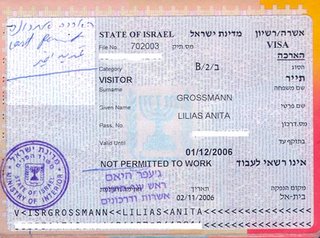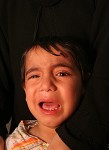Ghassan Abdullah writing from Ramallah, occupied Palestine, 6 December 2006 Anita Abdullah at her home in the Al-Bireh area of Ramallah. Israel has decreed that my wife and I can no longer live together. I am Palestinian and she is Swiss and we have been married for 28 years. She was recently given two weeks to leave the occupied Palestinian territory. The Israeli Ministry of Interior wrote on her Swiss passport: "LAST PERMIT." We have been living together in Ramallah for 12 years. We came in 1994, when, after the Oslo Agreement, we were encouraged to move to the West Bank by the prospect of 'peace' and development.
Anita Abdullah at her home in the Al-Bireh area of Ramallah. Israel has decreed that my wife and I can no longer live together. I am Palestinian and she is Swiss and we have been married for 28 years. She was recently given two weeks to leave the occupied Palestinian territory. The Israeli Ministry of Interior wrote on her Swiss passport: "LAST PERMIT." We have been living together in Ramallah for 12 years. We came in 1994, when, after the Oslo Agreement, we were encouraged to move to the West Bank by the prospect of 'peace' and development.
My wife Anita speaks Arabic, likes the landscape, cooks Arabic meals, and she cares for my grandfather's village house -- an old stone building and the plants around it -- more than I do. She votes in Palestinian elections as the spouse of a Palestinian. She is active in serving the local society in public health. She has numerous friends here and considers it home. She still has her valuable European element and contacts, but she doesn't want to be separated from this environment or from me, and I certainly do not want to be separated from her. Our children are grown up and work abroad, but they are also not sure they will be allowed to visit us here. On her way to visit us in Ramallah a few months ago, our daughter, who has a Swiss passport, was delayed for six hours at Tel Aviv airport and grilled when she landed. She was lucky. Others are deported to where they took off from, often spending a night or more at the notorious detention 'facility' at the airport.
For the past 12 years, Anita has managed to stay here by diligently renewing her permit or leaving and coming back every three or six months to comply with the Israeli 'law' that applies in the occupied Palestinian territories. She is fighting now to stay here by going to a lawyer and to the Israeli courts, hoping for an injunction to be able to stay until a verdict is reached. She is also in touch with her embassy, and she has joined others in the same predicament in addressing the European Union and the American consulate, and in talking to human rights organizations, both Israeli and Palestinian, and the media.
We don't know what to do. But whatever it is, we have to do it quickly. What do we do about our shared life, our papers and accounts, the hundreds of little things that we have grown to share? What do we do about the new apartment that we made the 'mistake' of purchasing at the wrong time? She was keyed up about what tiles to choose and how to model the kitchen. We can't believe, or accept, that we are going to be separated. We believe it though, when we are reminded by other 'mixed' couples or families around us who have, and are being, separated.
 Anita's visa, marked "Last Permit" in upper left corner (highlighted).
Anita's visa, marked "Last Permit" in upper left corner (highlighted).
Since last spring, the Israeli occupation authorities have been increasing the squeeze on holders of foreign passports by denying them entry into the Palestinian areas. Those affected include Palestinians with foreign passports or foreign wives, husbands, children, parents and other relatives. They also include foreign nationals, who come to teach at universities, work or volunteer with local or foreign non-governmental organizations, experts with various projects often funded by European countries, sympathizers or human rights activists.
Bitakhon is the magic word in Israel. In the name of bitakhon, or security, Israeli authorities can take any illegal, inhuman, immoral or aggressive measures against the Palestinian population under military occupation. They can throw the word bitakhon at any European or foreign diplomat who questions any of their measures, even when those measures go against human rights, international and humanitarian law, or the Fourth Geneva Conventions which govern the conduct of occupying powers towards the occupied population. It seems sometimes, to Palestinians, that a third rate official at any Israeli ministry can frighten the whole of the European Union and its officials by invoking the 'security' of Israelis, or by hinting at what Europe did to the Jews.
My wife is not the only one to have been given an ultimatum this last week. Dozens of other wives, husbands and children who have been living in the West Bank for years, renewing their Israeli-issued 'visitors' permits every three months, have been given short extensions, none of which exceed the end of this year. Children will have to be taken out of schools and will be separated from their parents. Mothers, fathers, sisters, brothers and grandparents of the cherished local extended families will be torn apart. Hundreds of others are also waiting their fate in the coming days and weeks. Thousands have been denied visits this last summer to their families and homes and roots. Summer is often the season for marriage of Palestinians divided by different passports or IDs and festivities used to fill the summer nights with music and dance. Not in the summer of 2006.
The Israeli occupation does not stop at confiscating the land. I feel occupied in my shirt pocket. My 'Palestinian' identity card is issued by Israeli authorities. They control the Palestinian civil population registry. Every birth, death, marriage, travels in or out, is controlled by Israel -- even in Gaza, disengagement withstanding. Of course, they control the water, the roads and the movement of people within the West Bank through hundreds of barriers and checkpoints. They uproot all the trees that they decide are in their way, that are in the way of the Apartheid Wall cutting its way into the flesh of our land, or in the way of their colonial settlers who decide to take over yet another spot of land or hill top that pleases them.
Why are the Israelis attacking mixed marriages of Palestinians? Before people fall in love in Palestine now, they ask about what ID each holds and from where it is issued. They do not want to build a life at risk of being torn apart from the start.
 American Patriotism: Waiting for a Tomorrow
American Patriotism: Waiting for a Tomorrow

 Land of the Free and Home of the Brave?
Land of the Free and Home of the Brave?



 America: Murder, Torture, Rape is on the Menu too many Allegations from Iraq, Afghanistan, Palestine to Somalia
America: Murder, Torture, Rape is on the Menu too many Allegations from Iraq, Afghanistan, Palestine to Somalia





















































